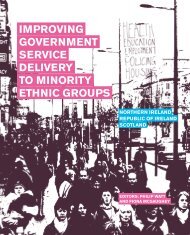4858 Mental Health Report - National University of Ireland, Galway
4858 Mental Health Report - National University of Ireland, Galway
4858 Mental Health Report - National University of Ireland, Galway
You also want an ePaper? Increase the reach of your titles
YUMPU automatically turns print PDFs into web optimized ePapers that Google loves.
Collaborative Practice and Policy<br />
objectives with regard to cross-border working. It was also mentioned that<br />
people should be trained properly and given the necessary human resources.<br />
Other<br />
Other points raised were that interested parties throughout the island should be<br />
enabled to collaborate on projects and not just communities close to the border.<br />
This type <strong>of</strong> working should be less funding driven and more aimed at promoting<br />
the value <strong>of</strong> joint working. It takes time to communicate and build up networks<br />
and this must be acknowledged.<br />
The benefits to the communities in both jurisdictions demand that we should<br />
promote mental health for its own sake on a cross-border basis. There is a need<br />
to identify and standardise what works and then incorporate it into joint health<br />
policy.<br />
Invited Reflections on Phase 1 Findings<br />
Following the study day discussion groups, questionnaires were sent with a copy<br />
<strong>of</strong> the newsletter to all who had been invited to the study day. A number <strong>of</strong><br />
closed and open-ended questions were asked to further explore perceptions <strong>of</strong><br />
cross-border working. The results <strong>of</strong> this exercise are now presented. The<br />
questions were based on the findings from the group discussions and were<br />
circulated to a wider group, many <strong>of</strong> whom were involved in Phase 1 but did not<br />
attend the study day in Armagh.<br />
A total <strong>of</strong> 41 questionnaires were returned. Responses from Northern <strong>Ireland</strong><br />
accounted for 61% (n=25) and responses from the Republic <strong>of</strong> <strong>Ireland</strong> accounted<br />
for 39% (n=16) <strong>of</strong> the returned sample.<br />
From the total respondents, 90% (n=36) were either currently involved in crossborder<br />
working or had been involved in the past. 33% (n=12) mentioned CAWT<br />
as their conduit for involvement in cross-border working. The type <strong>of</strong> activities<br />
mentioned were varied and ranged from once <strong>of</strong>f projects to a wide range <strong>of</strong><br />
health promotion and public health initiatives.<br />
Organisations with a mental health promotion focus accounted for 79.5% (n=31)<br />
<strong>of</strong> the respondents. However only 29.4% (n=10) <strong>of</strong> those actually had a policy<br />
document or strategic document outlining strategic goals for mental health<br />
promotion.<br />
The study day in Armagh was attended by 41.5% (n=17) <strong>of</strong> the respondents.<br />
52.5% (n=21) <strong>of</strong> the respondents made comments on the interim (Phase 1) report.<br />
It was generally felt that the report was very informative and that there were<br />
considerable advantages to pooling experiences and examples <strong>of</strong> good practice.<br />
One commentator felt that there should have been some acknowledgement <strong>of</strong><br />
the effects <strong>of</strong> the ‘Troubles’ on mental health.<br />
68
















